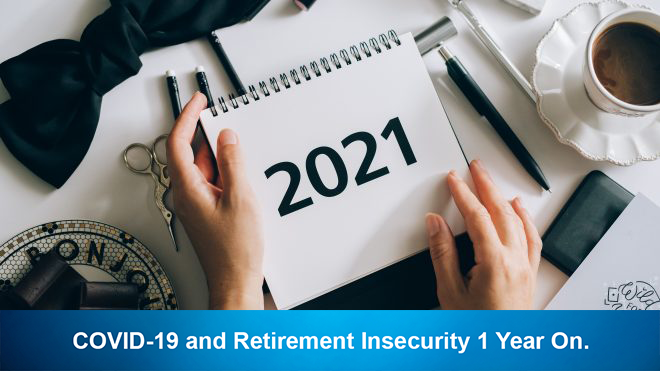The pandemic has affected many Americans’ concerns and plans for retirement. Here, CKS Summit Group navigates the “new normal” of retirement planning one year later.
It has been quite the year. COVID-19 has impacted many aspects of our daily lives and if you’re nearing or in retirement, you may be wondering if it will impact your retirement plan.
A majority of today’s workers and retirees range from feeling cautious to pessimistic about the economic outlook for 2021, according to the Principal Financial Group’s latest Retirement Security Survey, which explores consumer attitudes surrounding saving for retirement, market volatility and COVID-19. Nearly 75% of workers anticipate the pandemic is affecting their path to retirement and the same percent of retirees anticipate an impact on their accumulated retirement savings.


The economic fallout from the pandemic may create substantial uncertainty about financing retirement that could trigger Americans to work longer or rethink retirement altogether, according to a new report from the National Institute on Retirement Security.
The report, “Retirement Insecurity 2021,” details the results of an online survey of more than 1,200 working adults conducted by Greenwald Research. The survey found that two-thirds of Americans (67%) say the nation faces a retirement crisis and more than half (56%) are concerned that they won’t be able to achieve a financially secure retirement.
Among Americans who have changed or considered changing when they will retire, 67% say they planning for retirement later than originally planned because of Covid-19, according to the report. Yet for some older workers, the health and economic challenges of the pandemic proved to be too much, driving an unprecedented wave of baby boomers to leave the workforce. Between February and September of 2020, the number of retired boomers increased by 1.1 million, compared to only 250,000 who retired during the same period in 2019, according to a Pew Research Center analysis of labor force data.
How should you react to the current state of the market, based on your retirement schedule? If you are unsure on whether to retire early, late or to stick with your original retirement plan at all, here are a few tips that will help you keep your cool — and stay on course — as we navigate year two of the pandemic.


A dramatic market plunge can delay your retirement depending on how long the decline lasts. While it’s too soon to tell when that recovery might happen or what it will look like, so the key is to be as flexible as possible. If you were planning to retire in 2021/2022, you may need to rethink that and give the market extra time to recover.
The key is to try not to focus on everything you’re currently giving up, rather focus on the new opportunities you might have by delaying your retirement age. For example, if you were planning to retire this year at age 66 and claim your full monthly Social Security benefit, delaying retirement for a year or two will allow you to boost that benefit and lock in a higher monthly payment for life. If you’re 55 planning to retire at 65, it may mean pushing to 67. It’s unlikely to mean 75.
There’s a lot of uncertainty in the world today, and when you’re trying to map out your retirement, it can make for a very stressful situation. The best thing you can do, therefore, is to stay calm and adjust your plans as necessary.


If the recent market crumble has taught us anything, it’s the importance of always having a cash reserve. Some investors may feel compelled to buy as much in stocks as they can while prices are down, but they also need to set some cash aside for emergency funds, as well as a pile they could draw down if they do retire soon.
Those nearing retirement should try to refrain from withdrawing from their retirement portfolios, as a way to protect themselves from the “sequence of returns” risk, which is when investors withdraw from their principals and not gains. Doing so potentially deflates any future returns.
Additionally, it’s important to have emergency savings for unplanned expenses or scenarios, whether it’s home repairs or the effects of a global health crisis. As well as having cash saved, it’s a good idea to have at least six months’ worth of essential living expenses in the bank.


Despite the crisis, retirement plan design adjustments should never be one-size-fits-all and many newly retired boomers are looking for ways to maximize their retirement income and are turning to financial advisers for help.
An experienced financial advisor who specializes in retirement income planning can help you make the safest decision for your personal situation (after all, the last thing you want is to be making big financial decisions purely based on emotion). While many Americans are cautious to seek in-person advice due to the pandemic, some companies are offering virtual financial planning while the final phases of vaccines are rolled out nationwide.
As a firm specializing in retirement income planning, CKS Summit Group can help you virtually build a plan to reach your retirement goals while protecting your investments. To create your own personalized Retirement Income Plan, set up your virtual complimentary strategy session with us here today. Together, we can familiarize yourself with your options for managing finances from home and assess how your lifestyle has changed and impacts to your spending.



